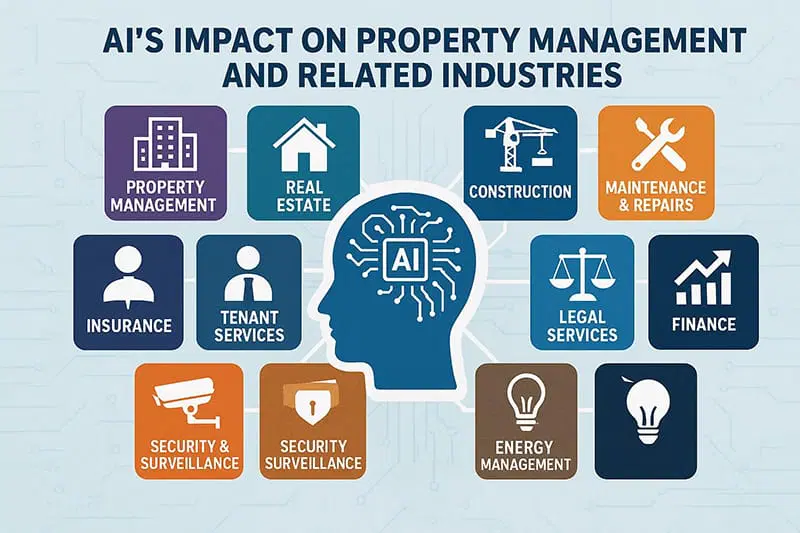AI’s Impact on Property Management and Related Industries

Subject: Review of AI applications and trends in property management, smart buildings, and related sectors, based on provided sources.
Summary: This briefing analyzes recent sources discussing the increasing integration of Artificial Intelligence (AI) in various industries, with a particular focus on property management and smart buildings. Key themes include the transformative potential of AI for efficiency, cost savings, and enhanced decision-making, alongside critical considerations regarding data privacy, algorithmic bias, and the necessity of maintaining a human element. The sources highlight specific AI use cases across multiple sectors, demonstrating a broad adoption of AI-driven solutions.
Key Themes and Important Ideas
AI as a Driver of Efficiency and Optimization:
Multiple sources emphasize AI’s ability to streamline processes, automate tasks, and optimize operations across industries.
In predictive maintenance, AI leverages data analysis to forecast equipment failures, optimizing maintenance schedules and reducing downtime. This is highlighted as a proactive approach for cost savings and extended machinery lifespan. “Predictive maintenance (Pd.M.) is a proactive approach to maintenance that leverages data analysis and advanced technologies to predict when equipment failures might occur. This strategy aims to optimize maintenance schedules, reduce downtime, and extend the lifespan of machinery.”
For property management, AI tools can automate tasks such as scheduling maintenance repairs, handling resident communications, and processing documents, freeing up human staff for more complex issues. “AI algorithms are becoming increasingly sophisticated, allowing property managers to offer highly personalized experiences to their renters.”
In smart buildings, AI integrates systems like HVAC, lighting, and security to optimize performance through automation and real-time data analytics. “Integrating systems such as heating, ventilation, air conditioning (HVAC), lighting, security, and energy management allows smart buildings to optimize performance through automation and real-time data analytics.”
Transportation and Logistics benefit from AI through route optimization, fleet tracking, and predictive maintenance for vehicles, leading to reduced fuel consumption, lower operational costs, and improved efficiency.
Manufacturing utilizes AI for production line optimization, waste reduction, and improved overall equipment efficiency through automation, robotics, and data analytics.
Enhanced Decision-Making through Data and Analytics:
AI’s ability to analyze vast amounts of data provides valuable insights for informed decision-making.
In predictive maintenance, analyzing historical data helps identify trends and predict future equipment behavior. “Historical data analysis involves examining past data to identify trends, patterns, and correlations that can inform future predictions.”
Property valuation is being revolutionized by AI analytics tools that quickly process market trends, property amenities, location, and transactional history to provide valuations in minutes. “With AI tools, property managers and owners can get a property valuation within minutes.”
AI-powered demand forecasting in supply chain management allows for predicting future demand with high accuracy, leading to improved inventory prediction and reduced overstocking or understocking.
Specific AI Applications and Use Cases:
The sources detail various specific applications of AI across different sectors:
Property Management: Fraud detection, identity verification, income verification, property valuation, smart security systems, intelligent access control, budgeting and financial forecasting, personalized resident communication, and automated leasing.
Smart Buildings:
Optimized HVAC and lighting control, predictive maintenance for building systems, security monitoring, energy management, and the use of digital twins for simulation and wear/tear modeling.
Healthcare:
Risk assessment, fraud detection, personalized finance tools, medical imaging analysis, drug discovery and development (including generative AI), genomics, mental health support, NLP for data analysis, and patient management.
Marketing and Media: Content personalization, sentiment analysis, and content generation.
Retail and E-commerce:
Price optimization and customer behavior analysis.
Supply Chain: Supply chain optimization, demand forecasting, and customer service automation.
Real Estate:
Market analysis, investment analysis, document processing, and virtual property tours.
Transportation and Logistics:
Route optimization, quality control, and inventory prediction.
Oil and Gas:
Safety and compliance monitoring, risk assessment, and incident reporting.
Emerging Technologies Complementing AI:
The sources mention the intersection of AI with other technologies:
IoT sensors are crucial for collecting real-time data for AI analysis, particularly in predictive maintenance and smart buildings. “Incorporating both IoT sensors for real-time insights and historical data analysis creates a comprehensive data collection strategy…” 5G technology is expected to revolutionize real-time monitoring by providing enhanced speed, capacity, low latency, and improved connectivity. “5G technology offers significantly higher data transfer speeds compared to previous generations, enabling real-time data transmission.”
Blockchain technology is mentioned in the context of enterprise solutions, smart contracts, and decentralized applications, although its direct integration with AI in the discussed use cases isn’t explicitly detailed beyond the service provider offering both.
Challenges and Considerations:
Despite the benefits, AI implementation presents challenges:
Data Dependency: The accuracy and effectiveness of AI are heavily reliant on the quality and quantity of data fed into the system. “The quality of the valuation depends on the data fed into the AI. Garbage in, garbage out.”
Cost of Implementation: Setting up AI systems can be expensive.
Lack of Human Touch: AI may miss nuanced or unique aspects that a human expert would recognize. “Sometimes, AI misses the unique charm or quirks of a property that a human appraiser would catch.”
Privacy Concerns:
AI systems in property management and smart buildings collect vast amounts of data, raising concerns about how personal information is used and stored. “Residents are increasingly concerned about how their personal information is being used and stored…”
Algorithmic Bias:
AI models can exhibit bias based on incomplete or skewed training data, potentially leading to unfair outcomes in areas like tenant screening. “A National Institute of Standards and Technology (NIST) study found that some AI models exhibit racial and gender bias, often because they rely on incomplete or skewed datasets.”
Maintaining Human Oversight:
Balancing automation with human interaction and oversight is crucial, especially in sensitive areas like leasing and screening. “Ensure transparency by maintaining human oversight in leasing and screening processes.”
The Importance of a Strategic Approach and Ethical Frameworks:
Successful AI adoption requires careful planning and consideration.
Organizations need to evaluate their current capabilities and readiness, including data availability, infrastructure, skill sets, cultural readiness, budget, and resources. Developing a detailed roadmap for implementation, defining objectives, selecting use cases, choosing the right tools, and starting with pilot programs are recommended steps. Addressing ethical considerations such as bias mitigation and data privacy is essential for responsible AI implementation. “By embedding ethical AI principles into daily operations, multifamily leaders can create a technology-driven environment that benefits residents and strengthens business performance.” Viewing AI as a “core capability, not just a tool” and focusing on solutions with “clear ROI” are highlighted as strategic considerations.
The Future of AI in Real Estate and Property Management:
The sources suggest that AI is fundamentally reshaping the real estate landscape.
The value of smart building deployments is projected to grow significantly in the coming years, driven by sustainability and cost reduction needs.
Generative AI is expected to evolve beyond content creation to more sophisticated analysis and drafting. The increasing prevalence of AI in tenant screening highlights a trend towards predictive scoring, raising ethical questions about algorithmic decision-making in housing. “The use of Minority Report-esque predictive scoring for renters is prevalent.”
Important Facts:
“The value of smart building deployments is projected to grow by 95% to $14bn by 2026 globally. This growth, up from $7bn in 2024, will be driven by sustainability initiatives and the need for cost reductions in building management.” – Report from Juniper Research. Some companies report that products starting out as digital twins have 25% fewer quality issues when they enter production. Smart buildings augmented with digital twin technologies have shown a potential increase in property value by 7-20%. “Almost two-thirds of the landlords we surveyed received tenant screening reports that contained some AI-generated score or recommendation.” (regarding AI-enabled tenant screening systems). “Almost one in five landlords reported receiving predictive information from screening companies.” (regarding predictive scoring for renters)
Only 3% of renters in a survey were provided with the name of the screening or consumer reporting agency. Firms that focus on innovation can experience up to a 20% higher revenue growth (source: PwC). Businesses with strong customer engagement strategies see a 10-15% increase in customer retention rates (source: Bain & Company). A National Institute of Standards and Technology (NIST) study found that some AI models exhibit racial and gender bias.
Conclusion:
The sources collectively paint a picture of AI as a powerful and increasingly pervasive technology with the potential to significantly impact property management, smart buildings, and numerous other industries. While the benefits in terms of efficiency, cost savings, and enhanced decision-making are clear and supported by various use cases and data points, it is equally evident that the ethical implications, particularly regarding data privacy and algorithmic bias, require careful attention and proactive mitigation strategies. The need for human oversight and the development of robust ethical frameworks are critical for ensuring the responsible and beneficial integration of AI into these sectors. The future of AI in property management and related fields will likely be shaped by a strategic approach that balances technological advancement with ethical considerations and a focus on augmenting, rather than entirely replacing, human capabilities.


